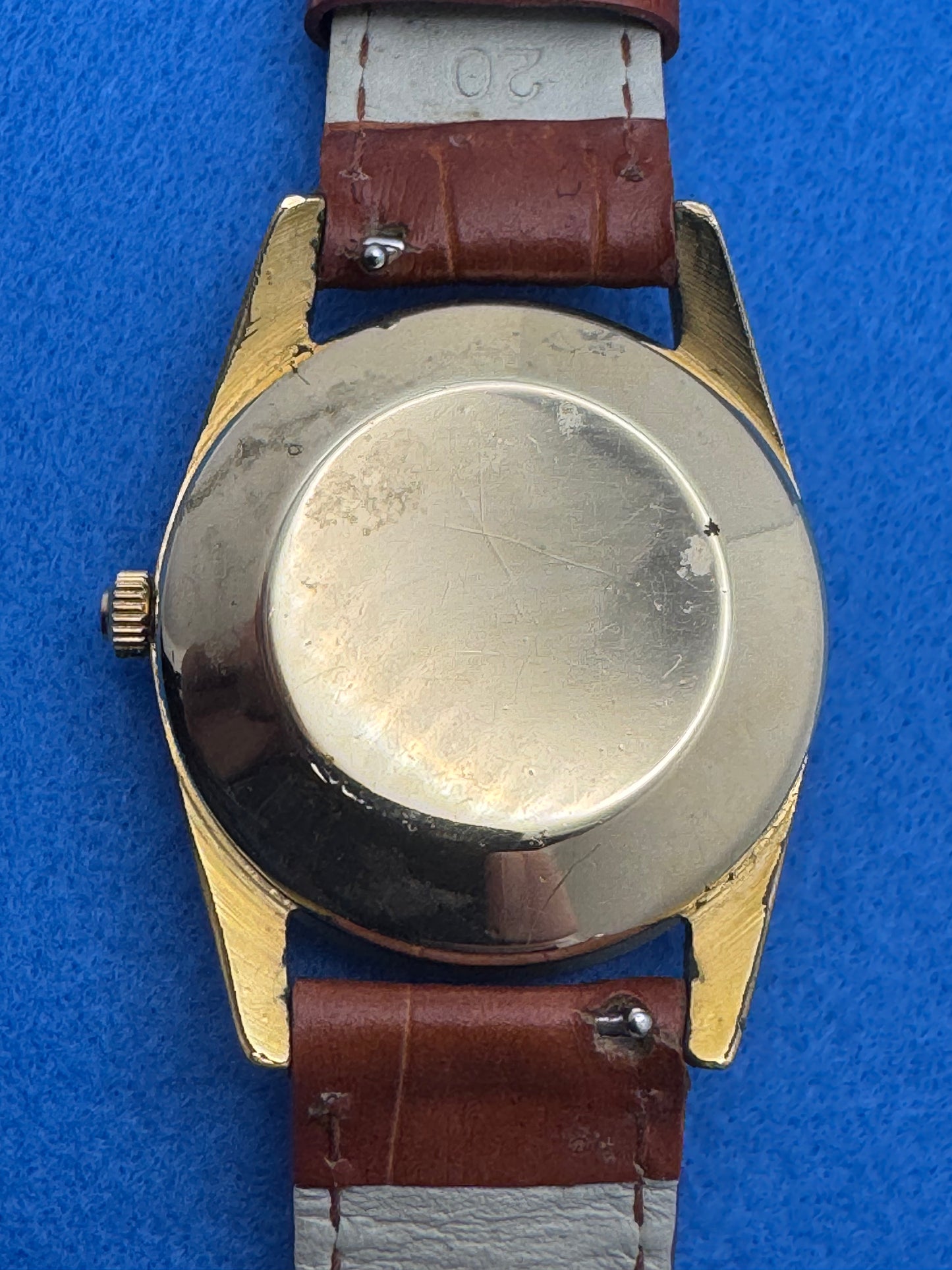Rare: Orient Grand Prix Olympia Car 64 Jewels (Japan, 1964)
Rare: Orient Grand Prix Olympia Car 64 Jewels (Japan, 1964)
Special edition for the Tokyo Olympics – 64-jewel automatic movement, a technical masterpiece and collector's item, overhauled in Japan
This rare Orient Grand Prix Olympia Auto was unveiled in 1964 to commemorate the XVIII Olympic Summer Games in Tokyo – a symbolic year marking Japan's resurgence and technological modernity. Orient honored this event with an intricately crafted automatic watch, equipped with 64 jewels – a number that alludes both to the year 1964 and to the exceptional technical sophistication of the timepiece.
Some of these stones (rubies) were decoratively set around the clockwork , without any functional significance, to emphasize the technological sophistication and aesthetics – a feature unique in this form in the history of Japanese clockmaking.
Technical data
- Brand: Orient (オリエント時計株式会社)
- Model: Grand Prix Olympia Auto 64 Jewels
- Caliber: Orient automatic movement with 64 jewels (some decorative)
- Year of construction: 1964
- Origin: Japan
- Case: gold plated, stainless steel back
- Case diameter: 37.3 mm
- Height: 13.5 mm
- Lug-to-lug: 45.6 mm
- Lug width: 20 mm
- Bracelet: new brown leather strap (alligator embossing)
- Weight: approx. 54 g (including strap)
- Dial: silver-colored with sunburst finish, gold indices and hands
- Display: Hours, minutes, seconds, date (window at 3 o'clock)
- Glass: curved acrylic glass
- Shock protection: Anti-shock system (Orient)
- Condition: good, with visible wear on the case sides; dial clear and original, wear already factored into the price
Special features
- Historical Olympia special edition 1964
- Elaborately decorated automatic movement with 64 jewels – a symbol of technological excellence
- Early use of decorative rubies as a design and prestige element
- Classic 1960s Japanese design with a narrow bezel and clear dial architecture
- Technically flawless, with an honest vintage look.
- professionally serviced by a Japanese watchmaker
Background: The Orient and the 1964 Tokyo Olympics
The 1964 Tokyo Olympic Games were a historic event: they marked Japan's return to the world stage after the war and symbolized the beginning of its economic boom. For the Japanese watch industry, this period meant a technological leap forward.
Seiko , Citizen , and Orient presented special models this year, showcasing their national innovation. While Seiko gained international recognition as the official timekeeper, Orient used the Games to highlight its technical creativity with the Grand Prix series, which featured highly complex movements, exquisite finishing, and a visually stunning number of jewels.
The name "Grand Prix" refers to the international competitive spirit, while "Olympia Auto" establishes the connection to the Games. These watches were considered prestige objects in Japan – a kind of technical statement for the golden age of Japanese watchmaking.
Historical overview: The Orient “Grand Prix” series (1958–1966)
The Grand Prix series was one of Orient 's most prestigious product lines, created in the late 1950s as a response to the technically sophisticated top-of-the-line models from Seiko (Crown/Chronometer) and Citizen (Chronometer Deluxe). It was intended to demonstrate the brand's capabilities on an international level.
-
1958 – Introduction of the Grand Prix:
Orient presented the first model in the series with the aim of achieving the highest possible accuracy and finishing in Japanese mass production. The early models featured 25 to 35 jewels and were hand-wound. -
1962 – Grand Prix 100:
Introduction of the first automatic movement in the series with 100 jewels, many of which were purely decorative. These models served as a technical showcase and an expression of artisanal ambition – a deliberate surpassing of the competition. -
1964 – Grand Prix Olympia Auto 64 Jewels:
A special edition watch commemorating the Tokyo Olympics. It combined the aesthetics of the Grand Prix series with the symbolic significance of the 1964 Olympic Games and a redesigned automatic movement with 64 jewels. -
1965–1966 – Transition to the Royal series:
The Grand Prix line was gradually replaced by the Orient Royal and King Diver models, which continued the technical development but focused more on everyday usability and modern design.
The Grand Prix models are considered today to be the pinnacle of early Japanese watchmaking – an expression of a time when Japanese manufacturers first wanted to compete with the best Swiss brands.
Collector's valuation
Today, the Orient Grand Prix Olympia Auto 64 Jewels is among the rarest Orient watches of the 1960s. Its combination of historical significance, technical sophistication, and distinctive design makes it a sought-after collector's item , especially in Japan and among connoisseurs of Japanese watchmaking history.
Warranty (used)
This is a used item. The limitation period for claims based on defects (statutory warranty) is 12 months from delivery.
Notice
As this is a vintage watch, water resistance cannot be guaranteed. To protect the movement, the watch should not come into contact with water or moisture.
Share
















